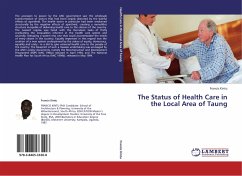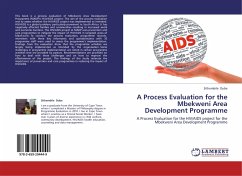
The Status of Health Care in the Local Area of Taung
Versandkostenfrei!
Versandfertig in 6-10 Tagen
32,99 €
inkl. MwSt.

PAYBACK Punkte
16 °P sammeln!
The accession to power by the ANC government saw the wholesale transformation of sectors that had been largely distorted by the baleful effects of apartheid. The health sector in particular had been weakened structurally by the negative effects of apartheid, creating a monolithic structure incapable of delivering health care to the citizens of the country. The nascent regime was faced with the Herculean tasks of firstly eradicating the inequalities inherent in the health care system and secondly, reshaping a system into one that could accommodate the needs of every citizen in the country. Equa...
The accession to power by the ANC government saw the wholesale transformation of sectors that had been largely distorted by the baleful effects of apartheid. The health sector in particular had been weakened structurally by the negative effects of apartheid, creating a monolithic structure incapable of delivering health care to the citizens of the country. The nascent regime was faced with the Herculean tasks of firstly eradicating the inequalities inherent in the health care system and secondly, reshaping a system into one that could accommodate the needs of every citizen in the country. Equally important in this regard was the creation of a new system underpinned by the values of equity, democracy, equality and unity - in a bid to give universal health care to the people of the country. The blueprint of such a massive undertaking was envisaged by the ANC s policy documents, namely the Reconstruction and Development Programme (RDP) (ANC 1994a) released in April 1994, and The National Health Plan for South Africa (ANC 1994b), released in May 1994.












